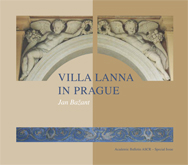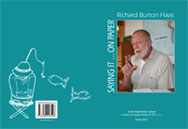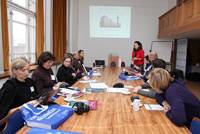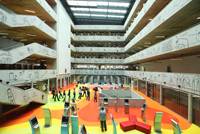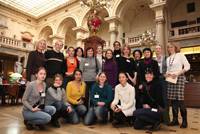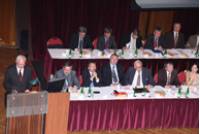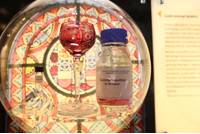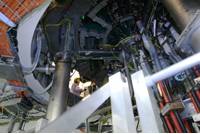
Academic bulletin 02/2000
RESUME
Photos from the 41st session of the Academic Council of the ASCR in Lužany
Research and Development Council of the Government of the Czech Republic
Information from the 129th session of the Czech Government
Kaleidoscope - Photo gallery
Photos from the 41st session of the Academic Council of the ASCR in Lužany
Research and Development Council of the Government of the Czech Republic
Information from the 129th session of the Czech Government's Research and Development Council
News from the Academic Council
The 41st session of the Academic Council of the ASCR was held on February 22nd, 1999, at Chateau Lužany.
Portraits from the Archives
František Roubík
František Roubík was a well-known historian and archivist. P. František Teplý, archivist of the aristocratic family Czernin, strongly influenced Roubík during his grammar school studies in Jindřichův Hradec and compelled him to choose his future scientific specialization. Roubík started to study history and "special historical disciplines" (codicology, metrology, epigraphy etc.) at the Philosophical Faculty of Charles University (Czech branch) in Prague. His studies were interrupted by military service from 1911 to 1919, including his confinement in detention jails in Prague and Vienna from 1917 to 1918. He graduated from the first course of State College for Archivists in 1921.
Science - Research - Society
General Assembly of ALLEA in Prague
On March 30th - April 1st, 2000, the Academy of Sciences of the Czech Republic will host the General Assembly of the alliance of 43 European academies of science and humanities called ALLEA (All European Academies). The representatives of important scientific institutions and notable scientists from the European continent will meet at the conference. In addition, observers from other European institutions related to science, for instance the European Commission, UNESCO, European Science Foundation, Inter Academy Panel, International Council of Scientific Unions and Academia Europaea, are expected to take part. Participants will seek to solve the principal questions concerning the role of science in the integrating Europe.
The 40th Anniversary of the Institute of Macromolecular Chemistry of the ASCR
The 40th commemoration of the founding of the Institute of Macromolecular Chemistry should not be overlooked because it provides an appropriate opportunity to evaluate its current development, accomplished goals, as well as plans and resolutions for the future.
New Centre for the Institutes of Humanities
A new centre for the institutes of humanities located on the street Na Florenci in Prague was opened on February 29th, 2000. In 1998 the building was under administration of the Institute of Czech Literature. After extended reconstruction it became the residence of the Institute of Ethnology, the Masaryk Institute, the Institute for Classical Studies, the Department of Languages and the editorial offices of the magazines Tvar and Vesmír. Opening a bookstore of the Academia publishing house has also been planned.
Open Letter to the Academic Community
Research Centres in the Korean Republic
Korea Science and Engineering (KOSEF), a governmental non-profit organisation, was founded in 1977. Its goal has been to support basic research in natural and technical sciences and co-ordinate the co-operation of universities and institutes of basic research and industry. Six years after its foundation KOSEF moved to Seoul, where the Taedok Science Town was built. Now such well-known Korean scientific institutes as the Korea Advanced Institute of Science and Technology (KAST) and the Korean Atomic Research Institute are located there.
Finnish Experiment - New Research Centres at the Highest Level
Finnish Centres of Excellence in Research began their activities in Finland on January 1st, 2000. The Finnish Academy of Sciences, with significant state support, was able to promote 26 research centres in which international teams of experts had been concentrated. They have obtained the best conditions for work, excellent equipment and sufficient financial support.
Inquiry
How do you use the newly re-opened Library of the ASCR?
Awards
Awarding Ceremony of the ASCR Awards
Babuška's Award 1999
Profile
Dean of the New Millennium
Recently named dean of the Philosophical Faculty of Charles University Assistant Professor Petr Kolář is the youngest academic notable ever to have achieved this position. Before that he worked at the Philosophical Institute of the ASCR in 1989 - 2000 and he became the head of the working team of logic in 1991. During that period he had also been teaching logic at the Philosophical Faculty of CU. His major area of interest and study is analytic philosophy and philosophical logic.
Introducing the Institutes
Institute for Classical Studies
Institute for Classical Studies of the ASCR is focused on the studies of European cultural heritage. Scientific activities of ICS are based on systematic research of source-books, first of all medieval and Latin literature, that are interpreted by using combination of philological, historical and semiotic methods. ICS also uses methods of computer data processing and co-operation with a large number of institutions in CR and abroad (such as universities, libraries, museums, galleries, archives and religious orders) to achieve these goals.
Events
SOFSEM - Traditional Meeting of Computer Scientists
SOFSEM, a conference joining together computer scientists and computer business representatives, took place in Milovy at the end of November. Academic Bulletin interviewed two of the experts to find out the history, ambitions and specifics of this workshop.
Institute Kondokovianum 1999
Institute Kondokovianum, also known as the Archeological Institute, was named after N. P. Kondakov and has a long history. Many articles were written on this institution, many exhibitions were organised to popularise it, among them the latest activities at the end of the last year (exhibition and guidebook).
Health Food
On February 9th, 2000, the Council for Popularisation of Science of the ASCR organised the press conference Health Food.
Winter School Prague 2000
The 4th year of the Winter School Prague 2000 for secondary school teachers started at the Faculty of Electrical Engineering of the Czech Technical University in Prague on February 14th, 2000.
Manuscripts of the Premonstratesian Monastery Teplá Published
The sources of the history of the Premonstratesian Monastery in Teplá are now available to students and research workers. The "List of the Manuscripts of the Premonstratesian Monastery Library" was published in two volumes on the occasion of the 80th birthday of its editor František Hoffmann on February 23rd, 2000.
News - Announcements
Resume
New Books
Chronicle: Events at the Academy in Photos
Topical Supplement
Zero Time Point - Science for the Third Millennium
The end of the three-part cycle does not close our exploration of the world of scientific knowledge. Any point of view, interview or news item will reflect the role of the scientific world in the year 2000 and open a gate to knowledge for the 3rd Millennium. There is no doubt that more of expected or even unexpected discoveries are awaiting us.


 Česky
Česky

